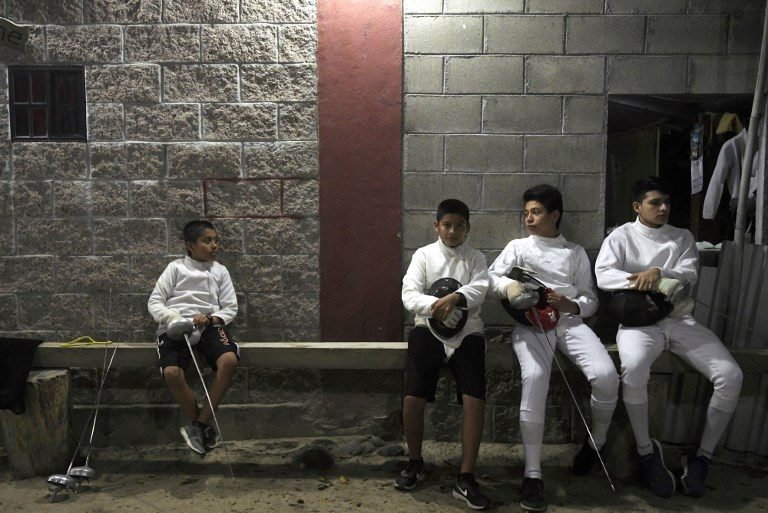SUMMARY
This is AI generated summarization, which may have errors. For context, always refer to the full article.

SAN PEDRO MASAHUAT, El Salvador – Using worn masks, torn gloves and rusted weapons, a group of youngsters in a rural village in El Salvador are put through their paces by a passionate coach.
But Ernesto Ramirez is not just training these youngsters to be talented fencers, he’s trying to keep them away from violence and trouble.
“This curbs violence, it certainly stops violence,” the 59-year-old former athlete and now government employee explains.
El Salvador’s murder rate may have halved since 2015 but it is still one of the highest in world at 51 per 100,000 inhabitants in 2018.
The country is blighted by gang violence and has around 70,000 gang members, some 17,000 of whom are in prison.
After dedicating 35 years of his life to fencing, Ramirez believes the state needs to stop “training and employing” so many police and soldiers to tackle its issues and instead prepare sports coaches to work with children.
“We need sports coaches engaged in their communities,” he said.
Although he was a successful athlete – a former Central American champion in the foil discipline and sabre silver medalist in the Central American Games in the 1990s – Ramirez says there is something more important that sport brings to children.
“Fencing is like a brotherhood,” says Ramirez, the former president of the Salvadoran Fencing Federation.
Seeing that no other entity was offering sporting programs for children, Ramirez launched his open-air fencing school in the village of San Pedro Masahuat in May 2009.
Almost 10 years later, and having overcome many obstacles, the club has around 300 medals to show for its efforts.
After finishing work at an office in the capital San Salvador, Ramirez heads to San Pedro Masahuat in the nearby department of La Paz to train children from poor families.
“He’s managed to transform the school’s children, teenagers and youngster’s way of thinking and behaving, distancing them in every way from negative and harmful things,” said Ana Ramirez, the mother of two of the school’s young fencers.
‘Better people’
“What I hope for is that my students become better sons, better citizens and better professionals in the future,” said Ramirez, who had 27 pupils from the get-go.
Ramirez has tried to teach his students the importance of concentration and discipline to “create conditions in which the other person does what I want him to, and that way I win the fight.”
Krissya Molina, 19, the national sabre champion last year, said that in the club “there are young people of our own age and we can express ourselves. Apart from this, sport helps us to become better people.”
Her 12-year-old brother Alexis Molina was student, national and Central American champion, as well as Pan-American runner-up in 2018.
Ramirez says the benefit of regular sports practice is having a positive knock-on effect as all of his students “have outstanding results” in their studies.
Without a gymnasium, the students train either outside or in a dusty cellar on a dirt floor.
At dusk, before their training session begins, they start by running up and down the 97 bamboo steps on the side of the hill where they train enthusiastically, until their faces are reddened and their brows sweaty.
Once they’ve put away their foils, epees and sabres for the night, they head home where they eagerly await their next training session. – Rappler.com
Add a comment
How does this make you feel?
There are no comments yet. Add your comment to start the conversation.